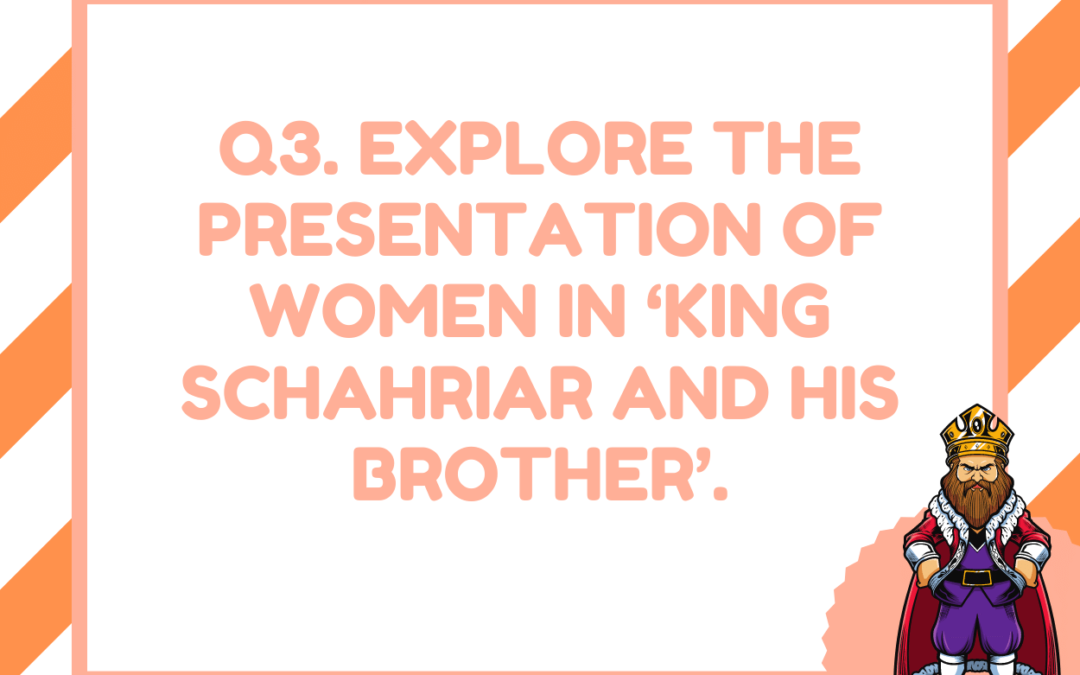Edexcel English IGCSE: King Schahriar and his brother
Q3. Explore the presentation of women in ‘King Schahriar and his brother’.
In your answer, you should think about:
- the sultan’s attitude towards women;
- the character of Sheherazade;
- other descriptions of women in the passage;
- the writer’s use of language.
You should refer closely to the passage to support your answer. You may use brief quotations.
Edexcel English IGCSE Model Essay by an Expert
The women in the story of ‘King Schahriar and his brother’ are experiencing the ultimate oppression by the king. However, with the formidable combination of Sheherazade’s intelligence and her sister’s loyalty, it is possible that the women will be delivered from their terrible fate.
The story involves an all-powerful and misogynistic leader, creating a terrifying situation for the women under his leadership. The king fails to recognise that women are individuals, and thus decides to punish all women for his wife’s actions. His new wives are described as “fresh”: a word commonly used to describe food, particularly meat. Thus women are not seen as human individuals, but as objects to be enjoyed and then discarded by the king. The king’s new policy is based on misogyny: he experiences “deepest shame” when he learns that his wife has been unfaithful. The word “shame” implies humiliation rather than sorrow, and the superlative shows the extent of this embarrassment.. Thus his policy of killing young women may be based on his need to feel power over all other women in the kingdom, to exert his authority and heal his wounded pride.
In her views and her actions, Sheherazade challenges this misogynistic arrangement. The rest of the society react to the policy with sorrow and fear, which is captured in the sensory imagery of parents “weeping” and “trembling”, and the town filled with “cries and lamentations”. In contrast, Sheherazade is angry, calling the practice “barbarous”, which is emotive vocabulary highlighting the king’s inhumanity. This anger prompts her to take action against the king. This is in stark contrast to her father, who is unquestioningly obedient to the king, which he explains in very simple and direct terms: “Whatever the cost, I will obey you.” Sheherazade’s willingness to stand up to authority – both the king and her father – challenges expectations of women at the time.
The relationship between Sherherazade and Dinazade confirms the idea that only women are brave enough to change the king’s ways. Contrasting the grand-vizier’s alarm and doubt in reaction to Sheherazade’s plan, Dinarzade gives unquestioning support to her sister. She even says that she will take part in the plan “with pleasure”, even though her life could be at risk by agreeing to help. This is despite the fact that Dinarzade is described as having “no particular gifts”. Simply by trusting in her sister, Dinarzade can play an important role in rescuing the women of the town. When the plan is taking place, Dinarzade does “as she had promised”, displaying her reliability and the solid teamwork between the two women.
In a society where women are oppressed and murdered, it takes two young women to finally stand up to their tyrannical leader. The presentation of women in the story challenges the reader’s expectations and the expectations of those in the story.



